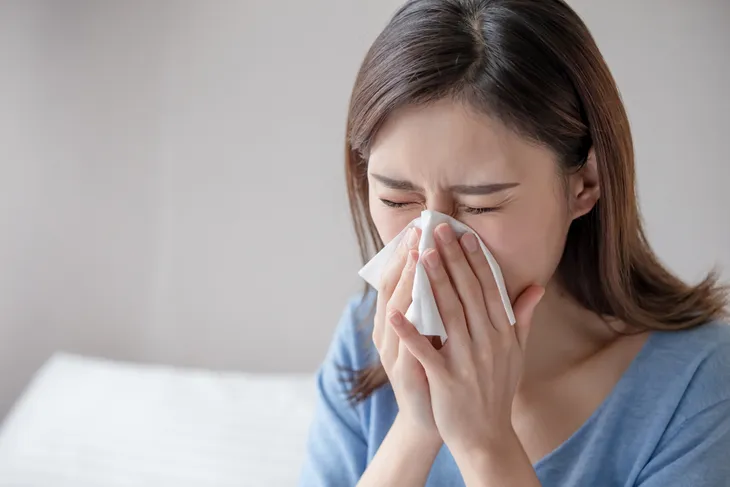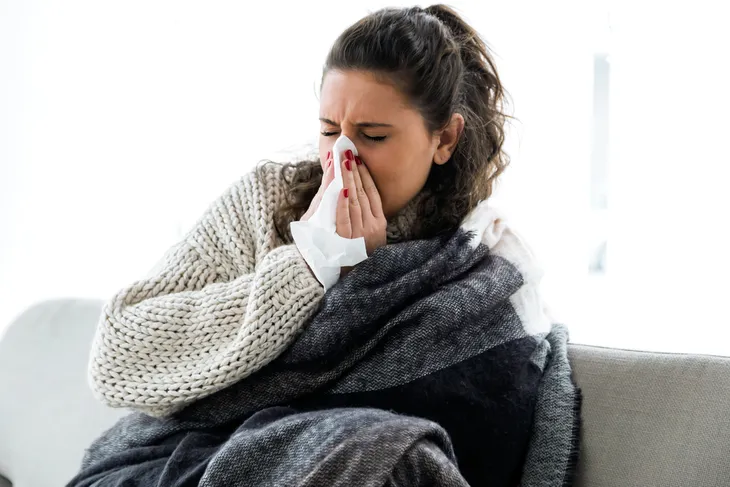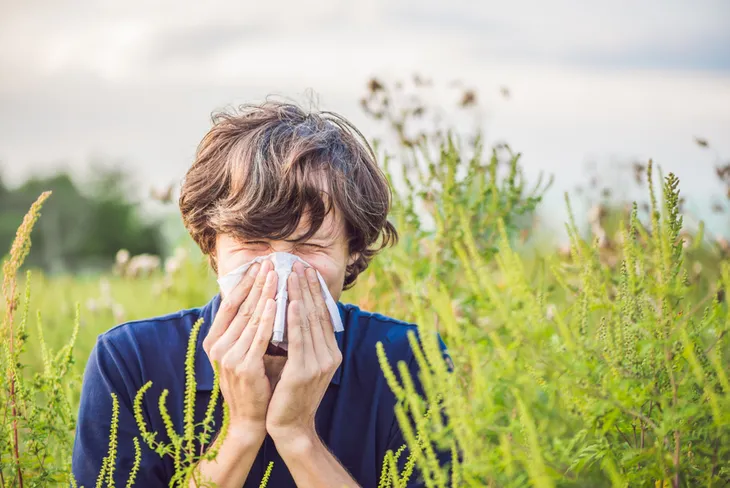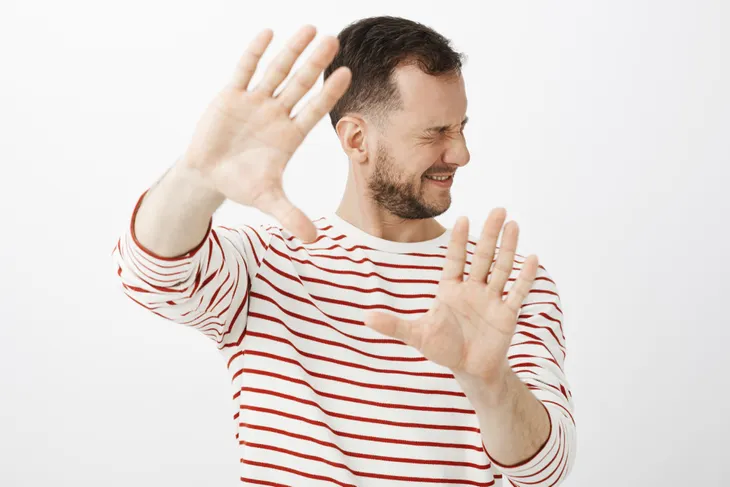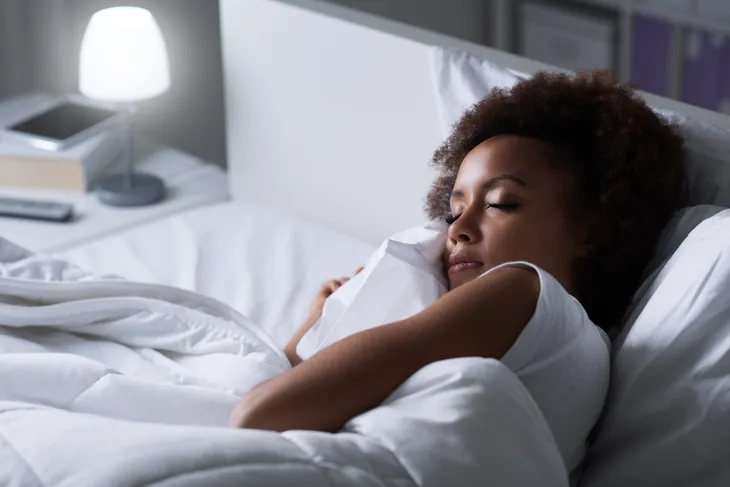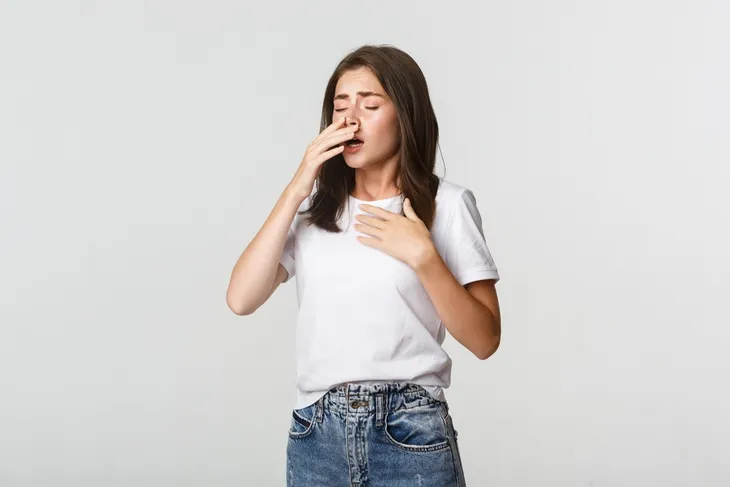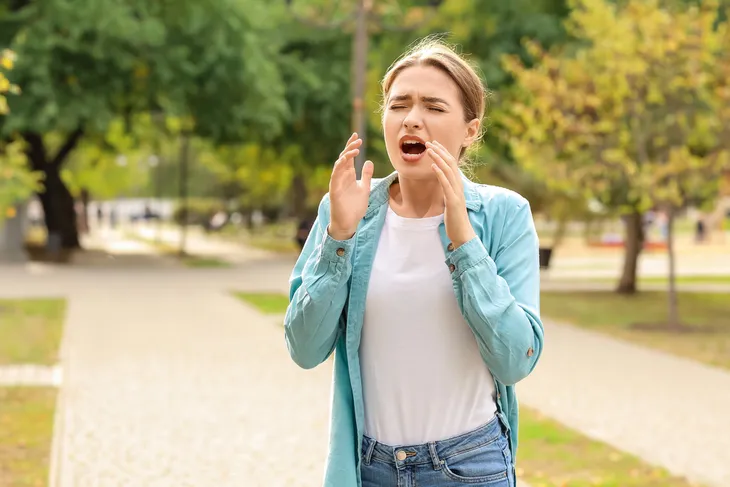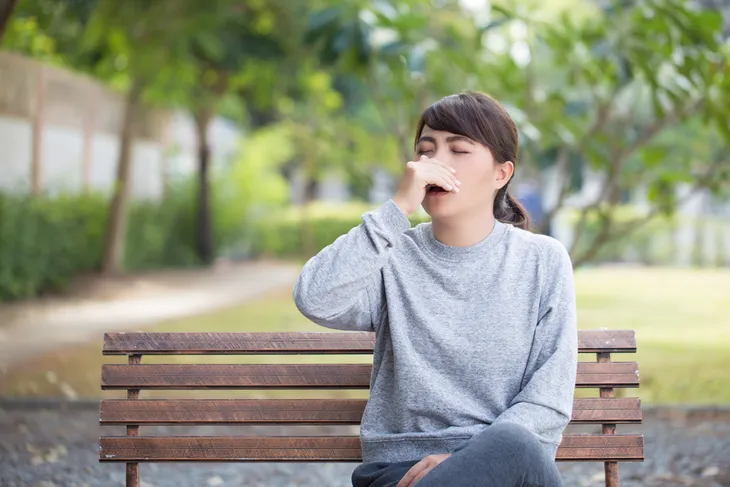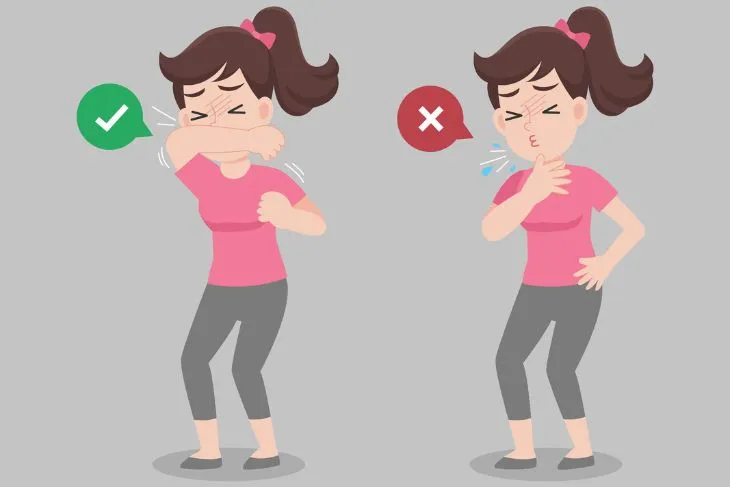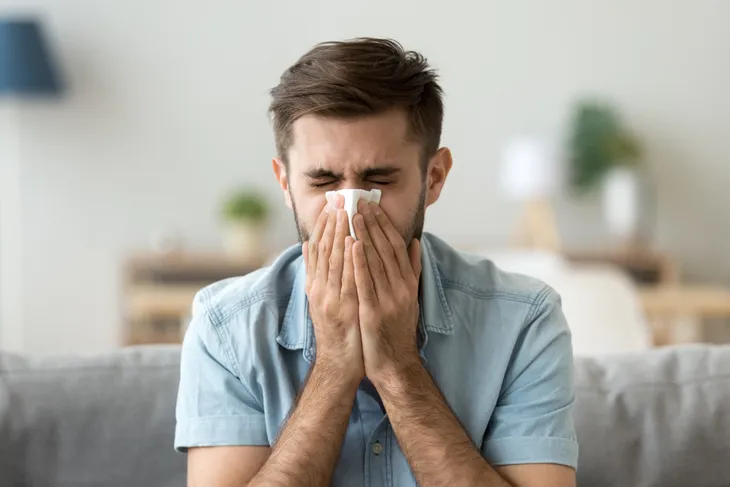- A sneeze occurs when a foreign particle enters our nose and interacts with the trigeminal nerve. This sends a signal to the brain that it needs to sneeze.
- Common causes of sneezing are allergens, pathogens like the common cold and flu virus, dust, cat dander, and chemical irritants like perfume.
- We can sneeze for other reasons too, such as when we look at a bright light (also known as photic sneezing).
- Other interesting facts are that we can’t sneeze while sleeping, we close our eyes to sneeze, and when we sneeze, air travels more than 100 miles an hour through the nose!
It might seem strange to think about it, but we all have a distinct sneeze. Some people do a delicate little ‘achoo!’ while others shout it from the rooftops. No matter what their response is, when we feel that tickle in our nose, it’s nearly impossible to fight the urge to sneeze.
Like many other responses of the body, sneezing is one of those fascinating phenomenons. Why do we sneeze? It doesn’t only occur when we inhale something strange like pepper or dust, it can also happen after looking at a bright light or plucking our eyebrows! In this article, we’ll explore the answer to this question and cover some other interesting facts about sneezing…
What Happens When We Sneeze?
A sneeze occurs when a foreign particle enters our nose and interacts with the sensory nerve known as the trigeminal nerve, explains SELF. This interaction sends an electric signal to the brain that it needs to clear itself. In response, the brain signals to the body that it’s time to sneeze and “the body responds by preparing itself for the impending contraction,” writes Healthline.
The body will force the eyes shut, the tongue moves to the roof of the mouth, and muscles brace. While this sounds like a lot, it all happens within a matter of seconds, notes the source. It’s believed the trigeminal nerve is the predominant mechanism response behind sneezes, but there could be more. For example, there may be other cranial nerves involved that experts just don’t know about.
Clears Unwelcome Stuff
Our nose is the gateway to our respiratory system, and according to the Merck Manual, is responsible for humidifying, warming, and filtering the air we breathe. It’s also the first line of defense between harmful particles and our lungs, explains Erich Voigt, MD, clinical associate professor and chief of general/sleep otolaryngology at NYU Langone Health to SELF.
In order to stop and trap pathogens from entering, the nose has a lining of mucous membranes. “Cilia, microscopic hairlike protrusions lining your nose, can channel this dirty mucus to the front of the organ (or down your throat),” writes the source. Occasionally, something enters the nose that triggers it so intensely, it wants to expel it immediately. In this case, what’s usually an ordinary cleansing process gets a boost in the form of a sneeze.
“The sneeze serves as a mechanism to clean the nose,” and stimulates the cilia to keep things moving, notes Michael Benninger, MD, chairman of the Cleveland Clinic Head & Neck Institute to SELF. “It’s basically rebooting the nose.”
Activated when Mucous Membranes are Irritated
Sneezing isn’t only associated with the nose. It can occur if the throat becomes irritated. No matter where it begins, it’s “a well-coordinated action involving a log of muscles and nerves beginning with a trigger,” explains Dr. Voigt to SELF. Common triggers are pathogens like common cold and flu virus, allergens (i.e. pollen or pet dander), chemical irritants (i.e. perfume), or physical irritants (i.e. dust).
If the sneezing is a result of allergies, the sneezing is a result of chemicals like histamine, which the immune system produces as a response to the allergens. Dr. Benninger tells SELF that sometimes with allergens and viruses the trigger is from the noses inflammatory response to these irritants. “Both allergic and nonallergic rhinitis (inflammation of the mucosal lining of the nose) can result in membrane swelling and excess mucus, potentially triggering sneezing,” writes the source.
Sneezing at Bright Lights
You step outside on a bright, sunny day and….”achoo!” Ever wondered why this is? According to the National Institutes of Health, the reason we sneeze when looking at a bright light is because of a photic sneeze reflex or solar sneeze reflex. It affects up to a third of the population and is an inherited trait, notes WebMD.
The reason it happens is thought to be some kind of cross-communication between the trigeminal and optic nerve. “The thinking is that the message for the pupillary reflex, which shrinks the pupils when exposed to bright light, somehow crosses with the sneeze reflex,” writes SELF after talking with Dr. Benninger.
Sneeze While Sleeping?
It’s not impossible to make nose with our nose while we sleep…can anyone who snores please raise their hand? However, it is not possible to sneeze while sleeping. The reason for this is because sneezing is a reflex action, explains Everyday Health.
“When you’re sleeping, the nerves involved in sneezing are relaxed, breaking the chain reaction of the typical sneeze,” writes the source. “If someone were to wave irritants under your nose while you were sleeping, however, you might wake up and sneeze.”
Why Do We Close Our Eyes?
Ever wondered why we all close our eyes while sneezing? You might have never even thought of it before, but most people never sneeze with their eyes open. Closing our eyes is a natural reflex instigated by the body. And while it is possible to keep them open, it’s not advised.
This natural response helps to shield our eyes from any irritants that might be ejected from the mouth or nose during sneezing, explains Matthew Purkey, MD, an ear, nose, and throat doctor practicing in Hoffman Estates, Illinois for Duly Health and Care to Health.com. And no, despite common lore, our eyes will not pop out of our head if we leave them open while sneezing!
One, Two, Three Sneezes
One, two, three times a charm? Researchers aren’t clear why people sneeze multiple times in a row or in succession. It’s likely that the first sneeze wasn’t strong enough, so the body keeps reacting with sneezes to try and expel the irritants, notes Healthline. It’s likely nothing to be concerned about.
If it happens often, it could be a sign of ongoing or chronic nasal stimulation or inflammation, adds the source, which could be the result of allergies.
Why Does Sneezing Feel Good?
There’s nothing worse than when the urge to sneeze rises, but doesn’t follow through. While sneezing isn’t necessarily fun, it can feel really good. Why is this? It’s likely because it relieves that tickling sensation in the nose, explains Health.com. It’s that same satisfying feeling we get when we scratch an itch. Jacob Hascalovici, MD, a neuroscientist and chief medical officer at digital health care platform Clearing, adds that it’s almost like an orgasmic experience.
“Both are characterized by a build-up of tension followed by a quick, intense release,” writes Health.com after talking to Heather Moday, MD, an immunologist in private practice in Maine to Health.com. “Not only that, but the muscle contractions involved in sneezing may trigger a very marginal rush of endorphins.” These are the feel-good chemicals that flood our brain during climax.
Should We Stifle a Sneeze?
Most of us have probably tried to mute a sneeze at some point or another, but it’s not recommended. Dr. Voigts tells SELF that because a sneeze generates so much force, holding it in could cause some internal discomfort and potentially even some damage, such as ear or sinus pressure or pain. “While it’s very rare, people have been known to rupture their throats while holding back a sneeze,” writes the source.
Another reason to just let it out is that it’s the body’s way of expelling bacteria or another irritant. Stifling a sneeze could reroute this bacteria to the ear and lead to an ear infection, warns Dr. Purkey to Health.com.
Noisy Sneezes
Some people tend to sneeze SO loud while others do it quietly. No matter what category you fall into, we all make some kind of noise when we sneeze. What’s pretty cool about our sneezes is the force behind them. Everyday Health points out that when a person sneezes, the air travels through their nose at more than 100 miles per hour!
Not surprisingly, this kind of force through tiny nostrils and our mouth, will make some kind of noise. The size of our nostrils certainly affects how loud this noise will be. Another interesting fact is that where we are from will depict what we say when we sneeze. According to Everyday Health, people who speak English say “achoo,” the French say “atchoum,” Italians say “hapsu,” the Japanese say “hakushon,” and Swedish people will say “atjo.”
Cover It Up!
This shouldn’t be new information, but we should all try our best to keep our sneezes to ourself. What we mean by that is cover them up! When we have an infectious disease like the cold or flu, our sneeze emits pathogens that could potentially infect the people around us, explains SELF. “That’s how the virus travels into other people’s eyes, noses, and mouths,” says Dr. Voigt to the source.
These particles may be able to travel up 6-feet or more, especially because sneezing contains so much force. To stop the spread of viruses, the Centers for Disease Control and Prevention (CDC) recommends sneezing into a tissue or the crook of your arm. Even if the sneeze is from an allergy or irritant, it’s still a good idea to cover them up.
Sneezing Superstitions
Sneezing isn’t exactly an overtly exciting or interesting topic, but there sure are lots of superstitions surrounding them! For starters, WebMD reassures that despite longtime rumors, our heart does not stop when we sneeze. The truth is that our chest does contract during a sneeze which can momentarily constrict our blood. “As a result, the rhythm of your heart may change, but it definitely doesn’t stop,” writes the source.
Another popular superstition is that our eyeballs will pop out if we sneeze with them open. Rest assured, they will remain securely where they are. “While a person’s blood pressure behind the eyes may increase slightly when he sneezes, it’s not enough force to dislodge the eyeballs from the head,” explains Neil Kao, MD, an allergy and asthma specialist at the Allergic Disease and Asthma Center in Greenville, S.C., to WebMD.
In addition to these two common myths, there are a couple others. For example, some people believe a sneeze means company is coming over or that a cat’s sneeze means it’s going to rain. Patti Wood, author of Success Signals: Understanding Body Language tells the source that people say a blessing after a sneeze because the Greek word for sneeze is “pneuma,” which means soul or spirit. “A post-sneeze blessing stems from the ancient belief that sneezing is a near-death experience, and that a blessing will prevent your soul or sneeze from escaping your body and will deter the devil from entering in,” writes WebMD.

